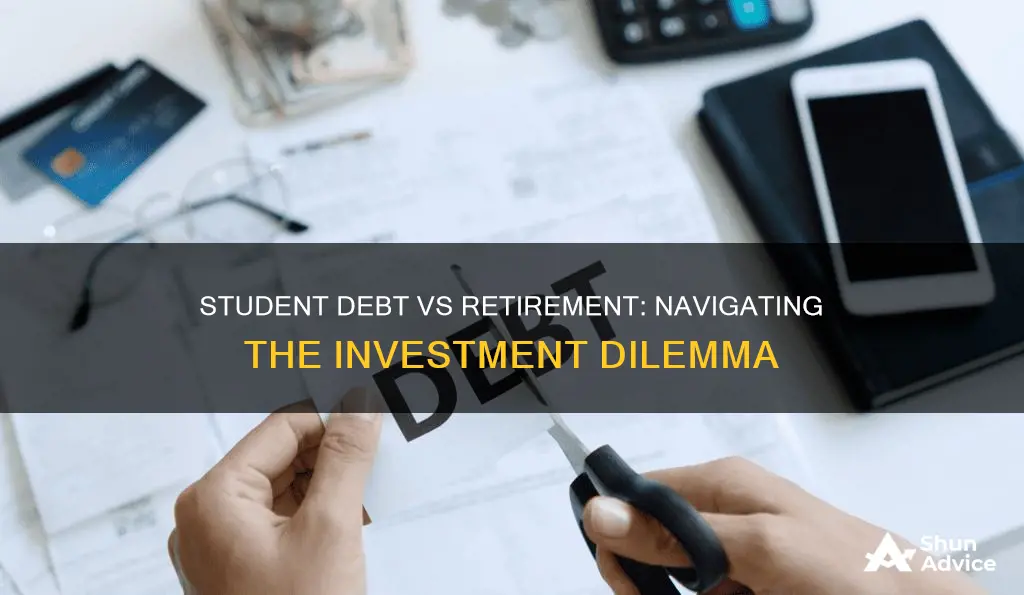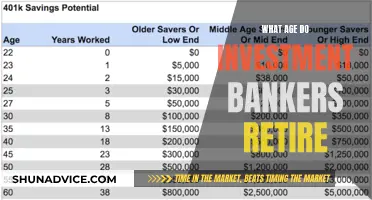
Whether you should pay off student debt or invest in retirement depends on your financial situation and goals. If you have high-interest student loans, it's generally recommended to prioritise paying off this debt before investing. However, if you have low-interest or interest-free student loans, investing your money instead may be more beneficial in the long term.
- Interest rates and return on investment: If your student loan interest rate is higher than what you could reasonably expect to earn by investing, prioritising paying off the debt is often advised. Conversely, if your expected rate of return from investing is higher than your student loan interest rate, investing may be the better option.
- Cash flow: If you have tight cash flow and your student loans are a burden, it may be better to focus on paying off the debt first. On the other hand, if your debt is manageable and you have money left over, investing for retirement could be a good option.
- Financial goals: Consider whether becoming debt-free is your top priority. If so, you may want to focus on paying off your student loans before investing. Alternatively, if you're working towards other financial goals, such as buying a home or saving for retirement, investing may be a better choice.
- Tax benefits and loan forgiveness: There may be tax benefits associated with both saving for retirement and paying off student loans. Additionally, if you're enrolled in a student loan forgiveness plan, it may not make sense to prioritise paying off the debt, as you could instead invest and grow your money over time.
It's important to carefully evaluate your financial situation and seek professional advice when making this decision, as it can have a significant impact on your long-term financial well-being.
| Characteristics | Values |
|---|---|
| Interest rates | If the interest rate on your student loan is higher than the expected rate of return on your investments, it is better to pay off the loan first. |
| Cash flow | If your cash flow is tight and your loans are a burden, focus on paying off your debt. |
| Debt burden | If your debt is preventing you from achieving other financial goals, such as homeownership, consider prioritising repayment. |
| Financial goals | If you desire to become debt-free quickly, put your extra money towards removing student debt. |
| Investment risk | Investments come with the risk of losing money, whereas paying off debt is a guaranteed return. |
| Debt-to-income ratio | Paying off student loans can lower your debt-to-income ratio, making it easier to qualify for a mortgage. |
| Tax benefits | The tax savings from retirement contributions may outweigh the interest costs on a student loan. |
| Loan forgiveness | If you are enrolled in a student loan forgiveness plan, it may not make sense to prioritise repayment. |
What You'll Learn

Weigh up your cash flow
Weighing up your cash flow is an important step in deciding whether to pay off student debt or invest in retirement.
Firstly, you need to understand your cash flow. This means tracking how much money you have coming in and going out over a set period. This will help you understand how much money you have left after covering expenses, and how much you can put towards your debt and/or investments.
If your cash flow is tight and your student loans are a burden, financial advisors generally suggest prioritising paying off this debt. This is especially true if you are planning to start a family, as you will likely need to pay off your loans before daycare expenses begin.
However, if your debt is only a small part of your budget, you may want to prioritise retirement savings. In this case, you can pay the minimum on your loans and use any leftover money to invest in your retirement. This is known as a dollar-cost averaging approach. With this approach, you can still put any windfalls, such as bonuses, towards paying off your debt.
It is also important to ensure you have enough liquidity or cash available for emergencies and other expenses or opportunities. Financial advisors warn that paying off debt but leaving yourself with little liquidity can cause you to miss out on future investment opportunities or force you to take out a high-interest loan in the case of an emergency.
If you have high-interest debt, such as credit card debt, this should be paid off as soon as possible.
The Debt Dilemma: Navigating the Investment vs. Loan Repayment Conundrum
You may want to see also

Understand your loan's rate
Understanding the interest rate on your student loan is crucial when deciding whether to prioritise paying off your student debt or investing in your retirement fund. Here are some key considerations:
Understand the Interest Rate on Your Student Loan
The interest rate on your student loan will significantly impact your repayment strategy. Generally, student loans are considered "good debt" due to their relatively lower interest rates compared to other forms of debt, such as credit card debt. However, it's important to review the specific rates you are paying to make an informed decision.
Compare Expected Investment Returns
When deciding between paying off student loans or investing, compare the interest rate on your student loan with the expected return on your investments. If your student loan interest rate is lower than the expected return on your investments, it may be more advantageous to make the minimum payments on your loans and focus on investing. This strategy can potentially result in higher long-term gains.
Consider the Type of Student Loan
The type of student loan you have can also influence your decision. Federal student loans typically offer lower interest rates and more benefits, such as loan forgiveness programmes. In contrast, private student loans may have variable interest rates that could increase over time, making it more attractive to pay them off sooner.
Evaluate Your Cash Flow and Financial Goals
Assess your monthly cash flow and financial goals when deciding how to allocate your funds. If your student loan payments are a significant burden and impact your ability to achieve other financial goals, such as purchasing a home, prioritising paying off your student debt may be more prudent. On the other hand, if your student loan payments are manageable and don't hinder your financial goals, investing for retirement could be a better option.
Weigh the Benefits of Retirement Savings
Retirement savings, such as contributions to a 401(k) or IRA, offer tax benefits that can sometimes outweigh the interest costs of your student loans. Additionally, investing in your retirement early on allows you to take advantage of compound interest, helping you build a substantial nest egg over time.
In conclusion, understanding your student loan interest rate is just one piece of the puzzle when deciding whether to prioritise paying off student debt or investing in retirement. It's important to consider various factors, including expected investment returns, the type of student loan you have, your cash flow, and the benefits of retirement savings. Seeking advice from a financial professional can also help you make an informed decision that aligns with your financial goals.
Silver's Investment Appeal
You may want to see also

Assess the tax benefits
When deciding whether to pay off student loans or invest for retirement, it is important to assess the tax benefits of both options. Here are some key considerations:
Tax Benefits of Investing for Retirement
Investing for retirement, such as contributing to a 401(k) or an individual retirement account (IRA), offers several tax advantages. These contributions can be tax-deductible or made with pre-tax income, lowering your taxable income and, consequently, your tax liability. This is especially beneficial if you currently fall into a higher income tax bracket, as it can result in significant tax savings. Additionally, any investment growth in these accounts is often tax-deferred, meaning you won't pay taxes on it until you withdraw the funds during retirement, potentially resulting in even lower taxes if your income is lower at that time.
Tax Benefits of Paying Off Student Loans
While paying off student loans may not offer the same upfront tax benefits as retirement contributions, there are still tax considerations. If you pay off your student loans faster, you may be able to deduct the interest paid on your student loans from your taxable income. This tax deduction can provide a financial benefit by reducing the overall cost of borrowing. However, it's important to note that this tax benefit may not always outweigh the potential tax savings of investing for retirement, especially if you're in a high tax bracket.
Weighing the Options
When deciding between investing for retirement and paying off student loans, it's crucial to evaluate the tax implications of both choices. Consider your current and expected future tax rates, as well as the potential investment returns and interest rates. If you expect your tax rate to decrease in retirement, investing in a tax-deferred account can be advantageous. On the other hand, if your student loan interest rate is relatively high, paying it off faster may provide more immediate tax relief through deductions.
Additionally, don't forget to consider any employer matches or contributions to your retirement savings, as these can significantly enhance the benefits of investing for retirement. Starting in 2024, employers will also be able to count qualified student loan payments as elective deferrals toward a retirement savings account, further complicating the tax benefit assessment.
In conclusion, while both options offer tax advantages, the decision depends on various factors, including your income, tax bracket, interest rates, and expected investment returns. Consulting a tax professional can help you navigate these complexities and make an informed decision that aligns with your financial goals and tax strategy.
Oil Investment: Where to Put Your Money Now
You may want to see also

Consider your employer's assistance
When deciding whether to pay off student loans or invest for retirement, it's important to consider your financial situation. This includes understanding your debt, cash flow, loan rate, tax benefits, and employer's assistance.
Some companies offer student loan repayment assistance, which can help you pay off your debt and free up funds for retirement savings. Starting in 2024, the SECURE 2.0 Act will allow employers to make 401(k), 403(b), or SIMPLE IRA contributions that match qualified employee student loan payments. This means your employer can help you build your retirement savings while you pay off your student loans.
Additionally, the CARES Act includes a provision for a payroll benefit, allowing employers to contribute up to $5,250 per year toward student debt until 2025. This benefit is not taxed for employees and is deductible for employers.
Employers can also offer access to student debt point solutions, such as financial wellness platforms that help employees optimize debt repayment strategies, refinance at lower rates, and reduce the overall cost of borrowing.
By taking advantage of these employer benefits, you can improve your financial situation, reduce stress, and contribute more to your retirement savings.
Smart Ways to Invest $200 Today
You may want to see also

Evaluate your debt-to-income ratio
Your debt-to-income ratio (DTI) is a number that tells lenders what portion of your monthly income goes towards debt payments. It is calculated by dividing your total monthly debt payments by your gross monthly income.
Lenders typically want to see a DTI of no higher than 50% from applicants who want to refinance their student loans. Generally, lenders like to see a DTI of 36% or lower for borrowers to qualify for the most favourable loan terms. However, many lenders will accept borrowers with a DTI of 45% or more if they have a good credit history and score.
Total monthly payments ÷ monthly income) x 100 = DTI
For example, if your gross monthly income is $4,000 and your total minimum monthly debt payments add up to $1,500, your DTI is 37.5%.
If your DTI is higher than 50%, reducing your DTI or applying with a cosigner can increase your chances of qualifying for a student loan refinance.
To evaluate your DTI, you must first calculate it. To do this, add up all your debts and all your income. Then, take your debt number and divide it by your income number.
Next, you should assess whether your DTI is within the range of what lenders typically want to see. If your DTI is higher than 50%, you may want to consider taking steps to reduce it. This could include paying off credit cards and other loans, increasing your income, or applying with a cosigner.
It is also important to keep in mind that your DTI is just one factor that lenders consider when making decisions about loan refinancing. Other factors include your credit score and history, verifiable income, and loan information.
Additionally, different lenders may have different requirements and guidelines for DTI, so it is a good idea to research the specific lenders you are interested in working with.
The Great Debate: Paying Off Your Home vs. Investing — Which Should You Choose?
You may want to see also







